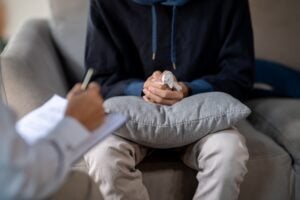The Wave pioneers the first child and family intensives for families affected by compulsive sexual behaviours in parents
Family members don’t exist in isolation. When one parent faces challenges with their mental health, everyone in the family is impacted, including their partner and children. Conflicts between parents affect parent-child relationships and young people’s mental health, while problematic behaviours among parents change the way children think and behave.
Psychologists describe families as systems, interconnected in multiple ways. Family systems can be organised to be supportive and nourishing, but harmful patterns can also develop that act as barriers to well-being and recovery.
When one parent is experiencing compulsive sexual behaviours, partners sometimes seek professional support. But this support rarely extends to children or the family system as a whole. However, compulsive sexual behaviours have a big impact on all parts of the family. That’s why we offer child and family intensives for families affected by compulsive sexual behaviours or sex addiction.
In this blog, we offer some information about the impact of compulsive sexual behaviours on children and the family system as a whole. We outline The Wave Clinic’s pioneering family and child intensives that offer unique and valuable support for young people affected by sex addiction.
What Are Compulsive Sexual Behaviours and Sex Addiction?
Compulsive sexual behaviour disorder is recognised in the ICD-11 as when a person fails to control sexual impulses, resulting in repetitive sexual behaviours, despite serious negative consequences in their everyday life. It’s classified as a form of impulse control disorder because people with compulsive sexual behaviours are unable to resist sexual impulses, even when they lead to serious harm.
The concept of addiction is very similar to both impulsivity and compulsivity. Addiction is usually applied when a person experiences additional features, such as tolerance to or withdrawal from a substance, as well as urges that are difficult to resist. However, compulsive behaviours – and the inability to resist impulses – are a core feature of addictions. Moreover, neurological evidence shows that people with compulsive sexual behaviours have altered functioning in brain networks involved in reward processing, habituation, and impulse control, in the same patterns as people with substance or gambling addictions.
Consequently, while compulsive sexual behaviours are classified as an impulse control disorder in the ICD-11, they may also be considered a type of addiction.
How Does Sex Addiction Affect Children’s Well-Being?
Sex addiction, or compulsive sexual behaviours, can involve different types of sexual behaviours. It may include watching pornography, online sex, or sex with their partner, other adults they know, or sex workers. These sexual encounters often objectify women, such as through sexist pornography content or disrespectful attitudes towards sex workers.
As the internet has become almost ubiquitous in many parts of the world, access to sexual content online has also proliferated. Research into compulsive sexual behaviours often focuses on online pornography consumption or ‘cybersex’ that can be accessed with only a computer or phone.
A 2010 study looked into the effects of compulsive cybersex behaviours on the family, including children and young people. They asked parents how they thought that cybersex addiction had impacted their children. The study found that:
- Children missed out on time spent with their parents
- Children had observed their parents arguing and experienced stress at home
- Children had been exposed to the pornography that their parents watched
Loss of Time with Parents
When a parent has a cybersex or sex addiction, they become preoccupied with seeking or engaging in sexual activities. Sex starts to dominate their daily lives, causing them to neglect their responsibilities or lose interest in activities they used to enjoy or care about. They may spend less quality time with their children, fail to fulfil obligations at home, or become less sensitive to their children’s needs.
Meanwhile, the other parent may put a lot of time and energy into managing their partner’s behaviours and dealing with the practical and emotional repercussions of their addiction. This means that they may also have less time to spend with their children and find it harder to meet their needs.
When parents are unable to meet children’s emotional or physical needs, it can disrupt the normal processes of social and emotional development. Young people can develop attachment insecurity, impacting the way they view themselves and other people, and the other relationships that they form. Attachment insecurity in parent-child relationships makes young people more vulnerable to developing mental health disorders, including symptoms of anxiety and depression, personality disorders, and eating disorders.
Living with Stress and Conflict at Home
Children can also be deeply affected by conflict and tension between their parents. Sex addiction often leads to hostile and ongoing conflicts at home, without effective processes of resolution.
Research shows that hostile conflicts between parents are linked to mental health symptoms in children, including low self-esteem and distress. Young people who are exposed to more family conflicts during high school are more likely to have mental health disorders later on in life.
Exposure to Pornography Content at an Early Age
When a parent engages in compulsive sexual behaviours that include watching pornography, children can be exposed to the content that they view. This means first ideas that children form about sex and sexual relationships may come from pornography, rather than from school, parents, or other trusted people.
Pornography often objectifies and degrades women, while endorsing specific gender roles that assign men and women certain roles and characteristics. These ideas can encourage misogynistic and sexist attitudes and behaviours, even at a very young age. In schools, misogynistic trends are escalating, impacting the mental health and well-being of young people with all gender identities.
How Does The Wave Support Families and Children Impacted by Sex Addiction?
At The Wave Clinic, we understand the impact of sex addiction and compulsive sexual behaviours on the family system, including on children. We offer family intensives that directly address the harm caused by these behaviours, supporting families to reorganise and recover from interpersonal harm or trauma. We support parents in understanding how to protect children from the damage caused by problematic behaviors and conflicts. We help children to manage and work through their experiences, addressing any mental health symptoms that have developed and helping to safeguard their mental health in the future.
Family Interventions
When a parent engages in compulsive sexual behaviours, it impacts the entire family. Family interventions address the harm caused to the family system and relationships between family members, focusing on family dynamics, boundaries, and roles. Therapists help to identify harmful patterns and structures that have developed and build more positive ones.
Family interventions can include different techniques and types of therapy, such as family systems therapy, psycho-education, and family behavioural therapy.
Individual Support for Young People
Alongside family interventions, children may also benefit from individual support. Individual therapy and group skills sessions help young people develop healthy coping mechanisms, recognise harmful role-modelling, and improve mental health symptoms.
Young people may benefit from a range of therapeutic approaches, including:
- Cognitive-behavioural therapy
- Trauma-focused therapy
- Interpersonal therapy
- Experiential therapy
- Somatic experiencing
- Psychodynamic therapy
What Do Our Family Intensives Include?
At The Wave Clinic, our family intensives include both family interventions and individual support for young people affected by compulsive sexual behaviours in a parent. Family intensives offer 14 or 21 days of treatment, combining the lessons of months of therapy into one or two weeks. During intensive programs, we encourage families to stay in a hotel close to our centre, facilitating full involvement and immersion in treatment sessions.
At The Wave, we believe that recovery involves more than talking therapies and psychoeducation. Transforming family dynamics and interactions requires developing new ways of relating in practice. Through experiential therapy, we support families in creating new memories and transforming their relationships, establishing new ways of being that endure.
After our intensive days, we provide follow-up care for families with the therapists they worked with at our centre, or others from our team. Families become valued members of our community, and we’re always ready to offer different kinds of support when it’s needed.
Getting in Touch
If you’d like to enquire about our family intensive programs, you can get in touch via WhatsApp, phone, or our website. You’ll find our contact details here.
We’ll respond to your request as quickly as possible, answering any questions you may have and exploring the next steps.
Fiona Yassin is the founder and clinical director at The Wave Clinic. She is a U.K. and International registered Psychotherapist and Accredited Clinical Supervisor (U.K. and UNCG).
More from Fiona Yassin











